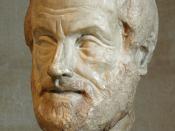Aristotle (384-322 B.C) was born in northern Greece, and as a young man went to study under Plato in Athens. He wrote extensively on philosophy, science, literature, and politics, but much of his work has been lost. His Politics is an acute and terse analysis of fundamental theoretical issues, which not only reflects both the ideals and the short comings of ancient Greek political life, but also contains valuable ideas for today.
'Man" said Aristotle 'is by nature a political animal'. Aristotle's view of humanity, nature and politics was rooted in the social life of Ancient Greece, and was very different from our own. His father was a doctor and a royal physician, and this medical background may have started Aristotle's interest in science. When Plato died in 347B.C, Aristotle left Athens. He joined a small group of Platonists in Assos on the eastern coast of Aegean. In 343 B.C
Aristotle accepted an invitation, offered perhaps through his father's contacts to become tutor to the son of Philip the 2nd.
His political thought is a critical analysis of the Greek 'poleis. Greece was not a single political system, but rather several hundred poleis, each independent, self governing and complete, economically independent. The way in which they organized their government varied considerably. One key feature, however, was always the same: women, slaves and foreigners were excluded from politics. As a result the political system was a reflection of the minority. Thus even the widest distribution of political rights, which the Greeks called 'demokratia', was far from the democracy we think of today. On the other hand political power was exercised directly by the people. Laws were made by an assembly of the citizens, not by a body of full time reps. i.e. being a citizen meant much more direct...


